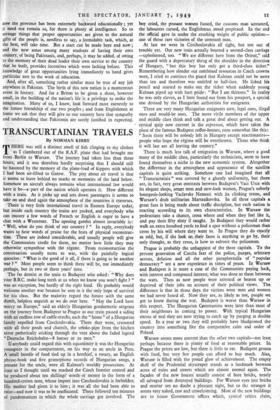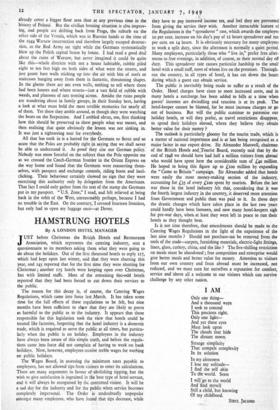TRANSCURTAINIAN TRAVELS
By NORMAN KIRBY
THERE was still a distinct smell of fish clinging to my clothes as I clambered out of the R.A.F. plane that had brought me from >Berlin to Warsaw. The journey had taken less than three hours, and it was therefore hardly surprising that I should still be haunted by the memory of the plane-load of kippers with which I had been air-lifted to Gatow. The pity about air travel is that it seems to leave behind no marks or memories of the land below. Somehow an aircraft always remains what international law would have it be—apart of the nation which operates it. How different with a train. As it picks up and sets down passengers it seems to take on and shed again the atmosphere of the countries it traverses.
There is very little international travel in Eastern Europe today, but inside each country the trains are packed, and everybody who can muster a few words of French or English is eager to have a chat with a Westerner. The opening gambit almost invariably is : " Well, what do you think of our country ? " In reply, everybody wants t IQ_ hear words of praise for the feats of physical reconstruc- tion. These are indeed considerable, and usually people will give the Communists credit for them, no matter how little they may otherwise sympathise with the regime. From reconstruction the conversation usually turns to war, with the painfully logical question: "What is the good of it all, if there is going to be another war ? " Most people seem to think there will be, not immediately perhaps, but in two or three years' time.
The fat dentist in the train to Budapest who asked : "Why does your B.S.C. make long teeth at us when we know you won't fight ? " was an exception, but hardly of the right kind. He probably would welcome another war because he sees in it the only hope of survival for his class. But the majority regard the future with the same dumb, helpless anguish as we do over here. " May the Lord have
mercy on Europe," said an elderly Hungarian gendarmerie sergeant on the journey from _Budapest to Prague as our train passed a siding with an endless row of cattle-trucks, each the " home " of a Hungarian family expelled from Czechoslovakia. There they were, crammed with all their goods and chattels, the smoke-pipe from the kitchen stove pathetically sticking through the vent above the faded legend "Deutsche Reichsbahn-8 horses or 20 men."
If anybody could regard this with equanimity it was the Hungarian youngster in the compartment, on his way to an uncle in Peru. A small bundle of food tied up in a kerchief, a rosary, an English phrase-book and five gramophone records of Hungarian songs, a present for the uncle, were all Kalman's worldly possessions. At least so I thought until we reached the Czech frontier control and he produced about ten shillings' worth of money in the form of a hundred-crown note, whose import into Czechoslovakia is forbidden. His mother had given it to him ; it was all she had been able to raise—and now it was to be confiscated. There followed ten minutes of pandemonium in which the whole carriage got involved. The boy cried, the peasant women fussed, the customs man screamed, the labourers cursed, the Englishman stood perplexed. In the end the official gave in under the crushing weight of public opinion— one of those rare victories of the common man.
At last we were in Czechoslovakia all right, but not out of trouble yet. Our new train actually boasted a second-class carriage —upholstered, too. " We are different here from the Orient," said the guard with a deprecatory shrug of the shoulder in the direction of Hungary, " but this boy has only got a third-class ticket."
Remembering how slender our combined resources in Czech crowns were, I tried to convince the guard that Kalman could not be more than ten and therefore was entitled to half-fare. He licked his pencil and started to make out the ticket when suddenly young Kalman piped up with hurt pride: "But I am thirteen." In reality he was only eleven, as I later found out from his passport, a special one devised by the Hungarian authorities for emigrants.
There are very many Hungarian emigrants now, legal ones, illegal ones and would-be ones. The more virile members of the upper and middle class think and talk a great deal about getting out. A cynical quip now current in the espressos, which have taken the place of the famous Budapest coffee-houses, runs somewhat like this: " Soon there will be nobody left in Hungary except reactionaries—. people who hope the regime will be overthrown. Those who think it will last are all leaving the country."
There is much less talk of emigration in Warsaw, where a good many of the middle class, particularly the technicians, seem to have found themselves a niche in the new economic system. Altogether the difference in the atmosphere and appearance of the satellite capitals is quite striking. Somehow one had imagined that all " Transcurtainia " was covered by a ghastly uniformity, but there are, in fact, very great contrasts between Budapest's Vaci Utca with its elegant shops, smart men and new-look women, Prague's soberly bourgeois-looking Vaclayske Nemesti with its clinking trams, and Warsaw's drab utilitarian Marszalkovska. In all three capitals a great fuss is being made about traffic discipline, but each nation is reacting according to its own characteristics. In Warsaw the pedestrians take a chance, cross where and when they feel like it, and pay their fifty zloty if caught. In Budipest they would rather walk an extra hundred yards to find a spot without a policeman than cross by his will where they want to. In Prague they do exactly as told, but, if the look on their faces is anything to go by, their only thought, as they cross, is how to subvert the policeman.
Prague is probably the unhappiest of the three capitals. To the present generation of Czechs fear of the police, purges, arbitrary arrests, delation and all the other paraphernalia of " popular democracy " are a new experience in times of peace. In Warsaw and Budapest it is more a case of the Communists paying back, with interest and compound interest, what was done to them between the wars. Then as now people were arrested or beaten up or deprived of their jobs on account of their political views. The difference is that in those days the victims were men and women we had never heard of. Now they are, as likely as not, people we got to know during the war. Budapest is worse than Warsaw in this respect. The Hungarian Communists were later than most of their neighbours in coming to power. With typical Hungarian excess of zeal they are now trying to catch up by purging at double speed. In a year or two they will probably have bludgeoned the country into something like the comparative calm and order of Poland.
Warsaw seems more content than the other two capitals—not least perhaps because there is plenty of food at reasonable prices. In Prague the prices are low, but there is little to eat. Budapest groans with food, but very few people can afford to buy much. Also, Warsaw is filled with the proud glow of achievement. The empty shell of the Prudential skyscraper stands as a landmark between acres of ruins and streets which are almost normal again. The facades of the new houses usually consist of bare bricks, nearly all salvaged from destroyed buildings. For Warsaw eyes just bricks and mortar are no doubt a pleasant sight, but to ills: stranger it seems very naked, raw and unwelcoming. Most of the new buildings are to house Government offices which, cynical critics claim, already cover a bigger floor area than at any previous time in the history of Poland. But the civilian housing situation is also improv- ing, and people are drifting back from Praga, the suburb on the other side of the Vistula, which was in Russian hands at the time of the 1944 Warsaw insurrection and therefore largely escaped destruc- tion, as the Red Army sat tight while the Germans systematically blew up the Polish capital house by house. I had read a good deal about the ruins of Warsaw, but never imagined it could be quite like this—whole districts with not a house habitable, rubble piled eight to ten feet high on both sides of what were the streets, and just gaunt bare walls sticking up into the air with bits of roofs or staircases hanging away from them in fantastic, threatening shapes. In the ghetto there are nos even walls, nothing to tell where there had been houses and where streets—just a vast field of rubble with weeds, and platoons of rats trotting across. Amidst the ruins people are wandering about in family groups, in their Sunday best, having a look at what must hold the most terrible memories for nearly all of them. Yet there they amble around, as though they were watching the boats on the Serpentine. And I ambled about, too, first thinking how this should be preserved to show people what war meant, and then realising that quite obviously the lesson was not sinking in. It was just a sightseeing tour for everybody.
All that has sunk in is a hatred for the Germans so fierce and so acute that the Poles are probably right in saying that we shall never be able to understand it. As proof they cite our German policy. Nobody was more forceful on the subject than the Pole opposite me as we crossed the Czech-German frontier in the Orient Express on the way home and found that the Germans were reasserting them- selves, with passport and exchange controls, riding boots and heel- clicking. Their behaviour certainly showed no sign that they were exercising this authority only by delegation from the Americans. That fact I could only gather from the text of the stamp the Germans put in my passport. " U.S. Zone," I read, and felt relieved at being back in the orbit of the West, unreasonably perhaps, because I had no trouble in the East. On the contrary, I crossed fourteen frontiers, but only had to open my luggage once—at Dover.







































 Previous page
Previous page